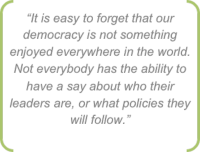

Grant Robertson
Grant Robertson has plenty of first-hand experience of thinking about the big issues affecting New Zealanders. Before becoming the Labour Party candidate and the MP for Wellington Central in 2008, Grant worked as a diplomat at the United Nations in New York. He was responsible for representing New Zealanders’ views on the environment, economic development, population, overseas aid, and South Pacific issues.
What do you think it means to be a New Zealander in the 21st century?
It means you are a citizen of a country with great potential – in its people, its environment, its sense of fairness and in terms of prosperity. We are a young country relative to the rest of the world. We are small, and somewhat removed in a geographical sense. We can use all those things to our advantage, to develop our country as a place where people want to stay and live their lives, with a good standard of living, surrounded by a diversity of people and with a natural environment that we all value and protect. Being a New Zealander in the 21st century also means been aware that there are some barriers in our way to achieving the kind of country we want to be. We need to be more inclusive and supportive of helping people achieve their potential, and more active in protecting our environment. With everyone on board we are guaranteed success.
What do you think are the major issues facing youth today and in the next 20 years?
That really is a question for young people to answer, and as I turn 40 very soon I am not sure I can class myself as a young person anymore! If I had to pick three issues I would say that we need to:
address the widening gap between the rich and the poor in our society. I believe we will only succeed as a country if we harness everyone’s talents. If families are struggling to make ends meet then the children of those families will suffer and miss out. We know from research that children who do not have opportunities when they are young are those who later in life do not succeed and sometimes end up in prison.
ensure that we make the development of our economy and the protection and enhancement of our environment goals that we advance together. We have the opportunity to grow our economy in a sustainable way that leverages off our people and our environment. If we separate them out then we will compromise our future.
support the inclusion of people from all backgrounds, while acknowledging the role of Maori as tangata whenua in our country. We cannot allow grievances to go unresolved, nor make people feel excluded. That is the path to division and insecurity.
Why do you think youth should vote?
It is easy to forget that our democracy is not something enjoyed everywhere in the world. Not everybody has the ability to have a say about who their leaders are, or what policies they will follow. Young people are especially important in this regard as decisions made by politicians will affect the world they will live in for a long time to come.
Why do you think it is important for youth to engage with the referendum?
The referendum at this election will decide how we go about electing our politicians. I am unashamedly a supporter of our current system, MMP. There are two main reasons for that. The first is that MMP has meant we have a Parliament that looks like New Zealand. There are a lot more women, Maori and minority groups represented than there ever were under the old First Past the Post system. The second is that under MMP it is really difficult for one party to be a majority on their own. This means parties have to work together to progress policies, and this usually leads to a better outcome for the country. Under First Past the Post one-party governments could often push through policy too quickly.
